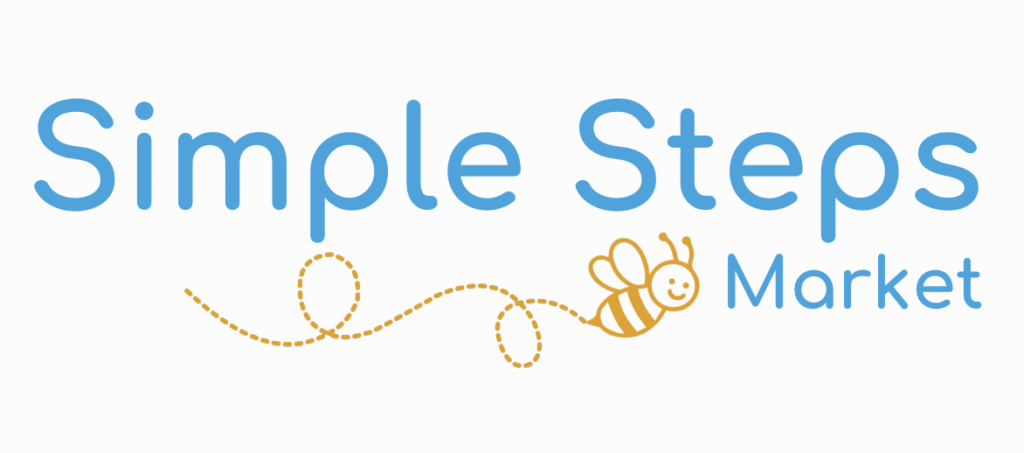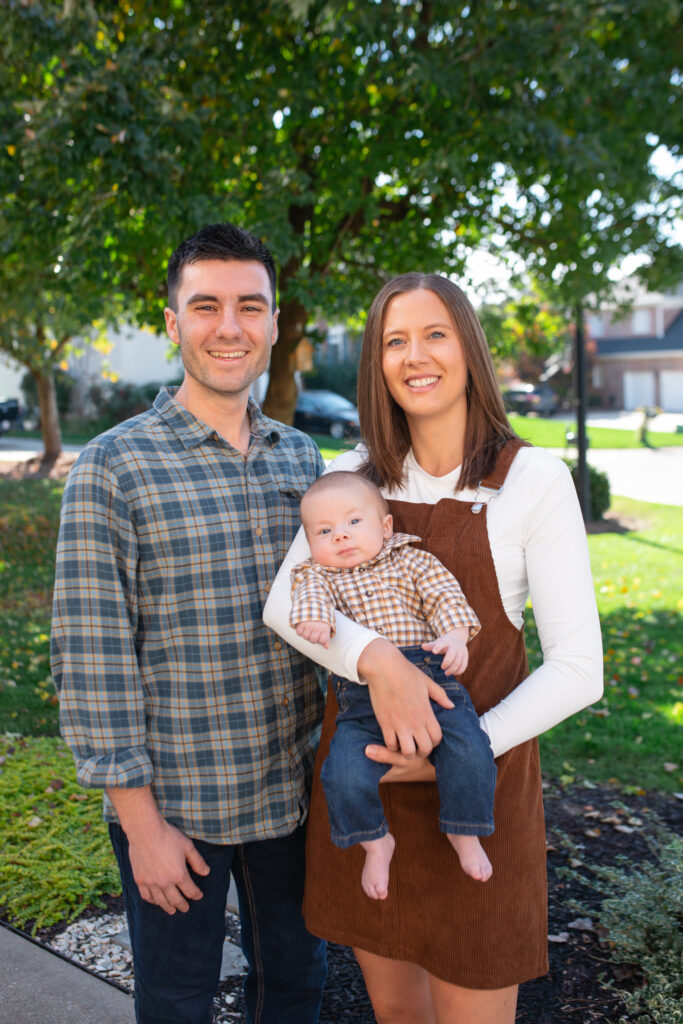The Dad Behind the Mission: The Simple Steps Market Story
Did you know that many baby products sitting on store shelves today contain potentially harmful ingredients like phthalates, synthetic fragrances, and even formaldehyde-releasing preservatives? It’s a reality that many parents aren’t aware of when they’re shopping for their little ones.
That’s where Simple Steps Market comes in. This online marketplace is dedicated to curating safe, non-toxic baby products—eliminating the guesswork for busy parents who want to make healthier choices for their families.
The marketplace was born from a very personal place. When Kevin Fitzgerald became a new dad, he experienced what so many of us go through, the overwhelming desire to give our children only the best and safest products. But as he started researching what was actually in conventional baby products, he was shocked by what he discovered. What began as his own quest to find non-toxic options for his son has now become Simple Steps Market, an online marketplace helping parents navigate the confusing world of baby product safety.

I talked with Kevin to learn more about his journey from concerned new dad to entrepreneur, and what I discovered was both enlightening and reassuring for any parent trying to make safer choices for their family.
The Science Behind the Safety
One of the first things I wanted to understand was how Simple Steps Market actually vets their products. After all, with so many brands claiming to be “natural” or “safe,” how do parents know who to trust?
Kevin explained that their process goes far beyond marketing claims. “Our vetting process combines scientific research with established third-party certifications like USDA Organic and GOTS,” he shared. “We’ve developed category-specific criteria because what matters for baby food differs from clothing or skincare.”
What sets Simple Steps Market apart is the expertise of their team. Kevin’s co-founders, Kyle Fitzgerald and Amanda Rocchio, bring years of experience researching non-toxic ingredients and have built trusted audiences around ingredient transparency. “We’re essentially doing the heavy lifting of ingredient research so busy parents don’t have to,” Kevin explained. “Every product on Simple Steps Market meets our science-based safety standards.”
While they don’t directly collaborate with pediatricians or dermatologists in their curation process, Kevin notes that many of the brands they feature are already recommended by these medical professionals. Their rigorous ingredient analysis ensures they’re selecting products that align with what healthcare providers look for when making recommendations to families.
The Hidden Dangers in Everyday Products
Kevin opened my eyes to some truly concerning ingredients lurking in conventional baby products, some of which I had no idea were potentially harmful.
“Some of the most concerning ingredients we see include phthalates in lotions and shampoos, which can disrupt hormones; synthetic fragrances that often contain undisclosed chemicals; formaldehyde and formaldehyde-releasing preservatives in wipes and bath products; and parabens in skincare items,” Kevin explained. “Many parents don’t realize that terms like ‘fragrance’ or ‘parfum’ on labels can hide dozens of undisclosed chemicals.”
But here’s what really caught my attention: “Many conventional diapers are also lined with polypropylene, which is essentially plastic against your baby’s delicate skin.” As a parent, that image is pretty unsettling.
The baby food category has its own set of concerns. Kevin highlighted seed oils like soybean and canola oil, which are highly processed and inflammatory, as well as synthetic preservatives and artificial colors. “Food dyes are one of the ingredients we’re most concerned about, especially for developing children,” he said. “Research has linked artificial food dyes like Red 40, Yellow 5, and Blue 1 to hyperactivity, behavioral issues, and attention problems in kids.”
What’s particularly frustrating is that products marketed as “natural” or “gentle” can still contain these problematic ingredients. This is exactly why Kevin created Simple Steps Market, to eliminate the guesswork and ensure parents can shop with confidence.
Practical Solutions for Common Issues
As a mom, I was eager to get Kevin’s recommendations for common baby skin issues. For cradle cap, he suggests gentle, plant-based oils like organic coconut oil or jojoba oil to soften flakes. For eczema, he recommends fragrance-free moisturizers while avoiding parabens and sulfates.
But here’s something I found fascinating: Kevin emphasized the gut-skin connection. “Research shows eczema is often linked to gut health issues,” he explained. “Sometimes the root cause is internal, which is why we’re particular about featuring baby foods without inflammatory ingredients like seed oils and synthetic preservatives that can disrupt gut health.”
His advice? “Simple, clean ingredients often work better than complex formulations.” And of course, he always recommends working with your pediatrician to determine what’s best for your specific baby.
Making Clean Products Accessible
One concern many parents have, and one I certainly share, is that clean, non-toxic products often come with higher price tags. This creates a real equity issue, as not all families can afford these premium options.
Kevin acknowledges this challenge head-on. “We’re very aware of this point and we wish that the best non-toxic options came at a lower price point,” he said. “We do everything we can to identify budget-friendly options and get those brands listed on our site.”
Beyond just offering more affordable products, Simple Steps Market focuses heavily on education. “A lot of the content we create is focused on education so anyone can take the lessons we’re speaking on and find better, cheaper options in their local stores,” Kevin explained.
Busting the “Natural” Myth
One of the most important things Kevin shared was about the misconceptions surrounding “natural” and “organic” products. “The biggest misconception is that ‘natural’ automatically means safe,” he said. “But ‘natural’ has no regulatory definition and can include harmful ingredients. Poison ivy is natural, but you wouldn’t put it on your baby.”
Similarly, while organic is better than conventional, it doesn’t guarantee the product is perfect for babies. Kevin emphasized that parents often assume if something is labeled “organic” or “natural,” they don’t need to read the ingredient list. But organic products can still contain essential oils that irritate sensitive skin, or unnecessary ingredients like organic cane sugar.
“The key is understanding that these terms are starting points, not endpoints,” Kevin noted.
Building a Movement
Despite regulatory challenges, Kevin has noticed positive shifts in the industry. “There are a ton of incredible brands creating amazing products for babies,” he said. “The problem is that they’re harder to find and usually sit right next to the toxic products on store shelves.”
This is where Simple Steps Market really shines, giving these smaller, cleaner brands the visibility they deserve. Kevin sees the platform as more than just a store. “It’s a sign that parents aren’t going to be tricked by mainstream brands and their marketing schemes. It’s a sign that parents want the best for their baby and they’re willing to do whatever it takes to make that happen.”
The Simple Steps Market community on Instagram is particularly engaged, with parents constantly asking questions and seeking information. “I love how engaged our parents are!” Kevin shared. “They not only want to know what products to use but they also want to know why!”
The Entrepreneur Dad Life
Kevin’s journey is particularly impressive when you consider the timing. He started building Simple Steps Market when his son was just 5 months old. “Incredibly difficult and incredibly rewarding,” is how he describes juggling new parenthood with entrepreneurship.

“There’s still a lot of late nights and early mornings trying to find time to work while he’s asleep,” Kevin shared. But his passion for the mission keeps him going: “I love it though because I’m building something that I’m passionate about and helping new parents in the same shoes I’m in, in the process.”
The lessons from parenting have directly influenced his approach to business. Communication and being realistic are key in both arenas. Kevin credits his supportive wife (who’s also involved in the business) and emphasizes the importance of constant communication with both family and his three co-founders.
“On being realistic,” Kevin explained, “when my son came home from the hospital we would alternate between who was eating and who was taking care of the baby. And though we love eating together, we knew that it just wasn’t our time for that and we didn’t try to force it.” This same realistic approach applies to building Simple Steps Market—understanding that growth takes time and being patient with the process.
Related Posts
- How to Tell If A Product Is Really Green or Non-Toxic
- 5 Best Sunscreen Lotions for Kids (Non-Toxic and EWG Rated)
- The Ultimate Organic Baby Nursery List (Non-Toxic Baby Furniture)
- The Perfect Homemade Playdough Recipe (Safe and Non-Toxic)
The Bottom Line for Parents
Kevin’s final advice for parents resonates with me deeply: “You don’t need to be perfect when it comes to using non-toxic products and you don’t need to do it all at once. Find the areas that you believe will be most impactful and start there. See how it goes and then you can always make additional swaps. You’re in this for the long haul!”
This approach feels so much more manageable than trying to overhaul everything at once. Whether it’s switching to cleaner bath products, being more mindful about food dyes, or simply reading ingredient labels more carefully, every small step counts.
In a world where marketing claims can be misleading and regulations haven’t kept pace with scientific understanding, having trusted curators feels invaluable. They’re doing the research so we don’t have to, making it easier for busy parents to make informed choices without spending hours decoding ingredient labels.
As Kevin says, this is a long game. But with parents becoming more educated and demanding better options, perhaps we really can create a world where non-toxic products are the norm, not the exception.